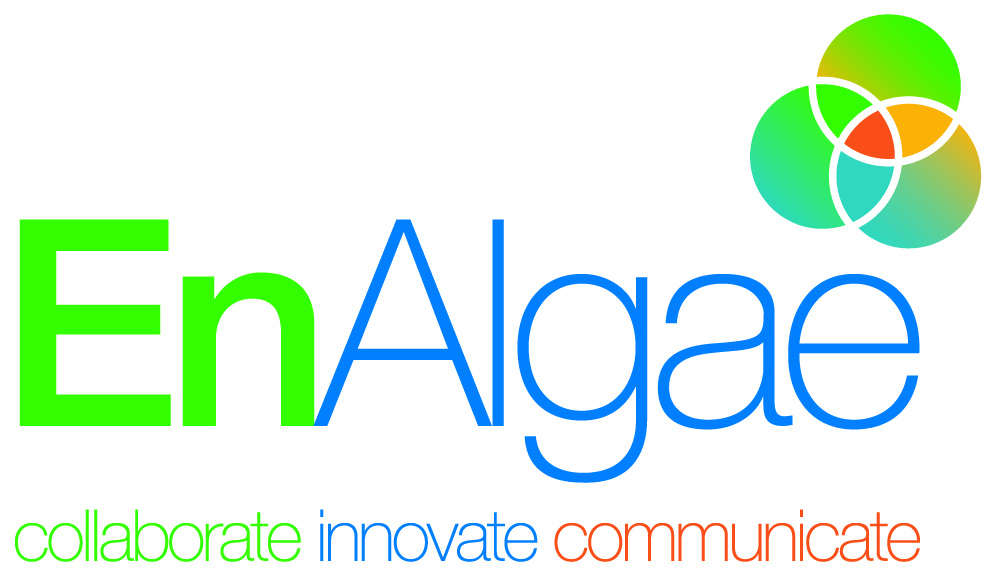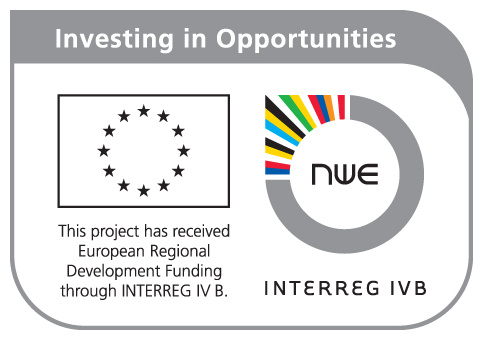Energetic Algae (EnAlgae)
- Project team:
Rösch, Christine (Project leader); Johannes Skarka; Andreas Patyk; Annika Weiss; Franziska Ketzer
- Funding:
INTERREG IVB North West Europe Program
- Start date:
2011
- End date:
2015
- Project partners:
Swansea University, Wales, UK (project management); Centre for Sustainable Aquatic Research (CSAR), UK (Lead Partner); European Biomass Industry Association, BE; Ghent University, BE; Laborelec Ltd (GDF-SUEZ), BE; Flanders Marine, BE; University College West Flanders, BE; Agency for Renewable Resources, DE; HTW University of Applied Sciences, DE; Centre d'Etude et de Valorisation des Algues, FR; National University of Ireland Dublin, University College Dublin, IE; National University of Ireland, Galway, IE; Wageningen UR (including Plant Research International) / ACRRES, NL; Birmingham City University, UK; InCrops Enterprise Hub, UK; National Non-Food Crops Centre, UK; Plymouth Marine Laboratory, UK; Queen's University Belfast, UK; The Scottish Association for Marine Science, UK
- Research group:
Project description
The share of renewable energies is meant to be increased further in the European Union in order to reduce the human-caused greenhouse gas emissions, to extend the reach of the traditional fossil fuels, and to improve safety in the domain of energy supply. Among the renewable energies, biomass takes center stage. It delivers the highest share of renewable power supply, and it represents a premium energy source with its excellent storage ability and its versatile usability in the production of fuels, electricity, and heating. In Europe, expansion of energy crop growing is possible but it is increasingly limited due to the extensive already existent land-use. Algae are highly advantageous in comparison to other cultivated biomass. While rape and corn transform only about one percent of the sunlight into chemical energy, algea do up to five percent, however, a rate that can only be reached with sufficient carbon dioxide supply. Additionally, with algae no agriculturally suitable land area is needed as they can be cultivated in technical systems. In this way, the algae biotechnology offers an alternative to the so-called "plate - petrol tank" dilemma. An additional advantage is that algae prosper in salt water, and in brackish waters or even in nutritious waste water. Consequently, they can reduce the competitive pressure on agriculture regarding water resources and fertilizers. The usage of algae for energy production, and for the production of valuable co-products is still at the initial stage, and there is a great need of knowledge-based support in decision making as far as politics and economy are concerned.
Against this background, the INTERREG project Energetic Algae (EnAlgae) aims at supporting, and accelerating the development of a sustainable algae-based biomass production in Northwestern Europe by transnationally pooling the available knowledge. A network of pilot plants adapted to the climatic conditions in Northwestern Europe will be established and operated. A plant registry of the existing, and of the planned pilot plants in Northwestern Europe will be compiled, and operational data will be accumulated in standardized formats which will then be edited and presented to the public. A second focus of the project is the identification of economical, ecological and social opportunities and challenges that lie in the usage of algae biomass in Northwestern Europe. Additionally, information on production systems, industry standards, and sales markets that are suitable for Northwestern Europe have to be made available to politicians, industry, and investors. The gathered information, the experiences, and the knowledge will be used for the implementation of a web-based decision guidance. This guidance will have, among other purposes, the purpose to identify site-specific convenient production methods based on algae, and to work out national, regional and local development strategies.
Under the ageis of ITAS, a sustainability analysis and evaluation for different production procedures based on microalgae and macroalgae will take place while applying the integrative sustainability concept analyzing the material flow, the environment effects - life cycle based -, and the costs. The aim is to identify the most efficient and ecologically, economically, and socially most favorable algae-based process chain as well as suitable sites for the algae cultivation. Additionally, a concept for sustainable algae production has to be developed.
Project website: http://www.enalgae.eu
Publications
Potenziale zur Erzeugung von Biomasse aus Mikroalgen in Europa unter besonderer Berücksichtigung der Flächen- und CO2-Verfügbarkeit. PhD dissertation
2020, March 12. Karlsruher Institut für Technologie (KIT). doi:10.5445/IR/1000046930
Critical Review of Microalgae LCA Studies for Bioenergy Production
2017. BioEnergy research, 11 (1), 95–105. doi:10.1007/s12155-017-9880-1
Chances and challenges for LCA on pilot scale technologies - the case of EnAlgae
2016. European Roadmap for an Algae-based Industry, Olhao, P, April 6-8, 2016
Evaluation and development of scenarios for the application of microalgae as food and feed
2016. 3rd Meeting of the MWK Research Area Microalgae, Hohenheim, February 26, 2016
Microalgae plant siting and biomass potential in North-West Europe under different land use restrictions
2015. 23rd European Biomass Conference and Exhibition (EUBCE 2015), Wien, A, June 1-4, 2015, online, ETA-Florence Renewable Energies
Environmental life cycle assessment (LCA) of seaweed production at QUB. Public output report of the EnAlgae project
2015. EnAlgae
Environmental life cycle assessment (LCA) of microalgae production at InCrops enterprise hub. Public output report of the EnAlgae project
2015. EnAlgae
Environmental life cycle assessment (LCA) of microalgae production at htw saar. Public output report of the EnAlgae project
2015. EnAlgae
Environmental life cycle assessment (LCA) of microalgae production at SU. Public output report of the EnAlgae project
2015. EnAlgae
Summary report on sustainability of algae production in North West Europe
2015. EnAlgae
Renewable energies in Germany and Europe - Presentation of results from the research projects BioenNW, EnAlgae, and APV-RESOLA
2015. Lunch Seminar, ENV Waterloo, CDN, November 23, 2015
Comparative LCA of microalgae production in horizontal tubular PBRs for biogas application
2015. 3rd European Workshop on LCA for Algal Biofuels and Biomaterials (2015), Brussels, Belgium, May 11, 2015
Microalgae for energy production, mitigation of greenhouse gas emissions and wastewater treatment
2015. Minisymposium "Microbiologie de l’Environnement et Biomasse" (2015), Strasbourg, France, April 10, 2015
Microalgae plant siting and biomass potential in North-West Europe under different land use restrictions
2015. 23rd European Biomass Conference and Exhibition (EUBCE 2015), Vienna, Austria, June 1–4, 2015
LCA of microalgae culture in a recirculating aquaculture system for bioremediation
2014. EnAlgae Pilot Symposium, Kortijk, B, 18.September 2014
A framework for the integrative sustainability assessment of algal biofuels
2014. 22nd European Biomass Conference and Exhibition (EUBCE 2014), Hamburg, June 23-26, 2014
Environmental life cycle assessment of an algae production plant in the EnAlgae project and progress towards a framework for an integrative sustainability assessment
2014. 2nd European Workshop on LCA for Algal Biofuels & Biomaterials, Bruxelles, B, April 24, 2014
Sustainability assessment of microalgae
2014. EnAlgae Showcase for European Parliament, Bruxelles, B, November 17, 2014
Linked data for potential algal biomass production
2013. Semantic web, 4 (3), 331–340. doi:10.3233/SW-130105
Nachhaltige Algenproduktion durch Nährstoffrecycling
2013. Sustainable BioEconomy gemeinsam mit Workshop BioBoost, Karlsruher Institut für Technologie (KIT), 28.-29. November 2012 Folien auf CD-ROM Karlsruhe : Karlsruhe Inst.of Technology, Campus North, 2013 urn:nbn:de: 0005-900156
Aquatische Biomasseproduktion zur Lösung des Teller-Trank-Dilemmas
2013. Vortrag im Rahmen der Veranstaltungsreihe der Rosa Luxemburg Stiftung, Karlsruhe, 6. Juni 2013
Teller oder Trank? Konfliktlösung durch Produktion aquatischer Biomasse
2013. Vortrag im Rahmen des Kolloquiums ’Landschafts- und Pflanzenökologie’ der Universität Hohenheim, Hohenheim, 19. November 2013
Pack die Alge in den Tank. Biokraftstoff der neuen Generation
2012. tag & nacht (Kundenzeitschrift von 124 regionalen Energieversorgern), 11–12
Indicators for Assessing the Sustainability of Microalgae Production
2012. Technikfolgenabschätzung, Theorie und Praxis, 21 (1), 63–71. doi:10.14512/tatup.21.1.63
Challenges and perspectives of microalgae production. Introduction to the thematic focus
2012. Technikfolgenabschätzung, Theorie und Praxis, 21 (1), 5–16. doi:10.14512/tatup.21.1.5
Materials flow modeling of nutrient recycling in biodiesel production from microalgae
2012. Bioresource Technology, 107, 191–199. doi:10.1016/j.biortech.2011.12.016
Microalgae biomass potential in Europe. Land Availability as a Key Issue
2012. Technikfolgenabschätzung, Theorie und Praxis, 21 (1), 72–79. doi:10.14512/tatup.21.1.72
LEAPS: Realising the potential of algal biomass production through semantic web and linked data
2012. 8th International Conference on Semantic Systems (ISEM 2012), Graz, A, September 5-7, 2012. Ed.: H. Sack, 117–124, Association for Computing Machinery (ACM). doi:10.1145/2362499.2362516
Energie aus Algen - Neuer Hype oder nachhaltige Lösung?
2012. Vortr.: Zentrum für Angewandte Kulturwissenschaft, KIT, 28.Juni 2012
Nachhaltige Algenproduktion durch Nährstoffrecycling
2012. Vortrag: Kolloquium Sustainable BioEconomy; Workshop BioBoost am Karlsruher Institut für Technologie (KIT), Karlsruhe, 28.-29. November 2012
Algen - Erfolgsmodelle aus der Urzeit für die nachhaltige Lösung des Energieproblems?
2012. Vortrag: Kinder- und Jugenduniversität Bretten, 21. November 2012
LEAPS: Realising the potential of algal biomass production through semantic web and linked data
2012. 8th International Conference on Semantic Systems (ISEM 2012), Graz, A, September 5-7, 2012
Nutrients recycling in biodiesel production from microalgae
2011. Faulstich, M. [Hrsg.] 19th European Biomass Conf. : From Research to Industry and Markets ; Proc.of the Internat.Conf.held in Berlin, June 6-10, 2011 DVD Firenze : ETA-Florence Renewable Energies, 2011, 105–110
Research on microalgae at KIT
2011. 19th European Biomass Conference and Exhibition (EUBCE 2011), Berlin, Germany, June 6–10, 2011
Nutrient recycling in biodiesel production from microalgae
2011. 19th European Biomass Conf.and Exhibition, Berlin, June 6-10, 2011
The potential of energy production from microalgae in Europe with particular reference to land and CO₂ availability
2011. 19th European Biomass Conf.and Exhibition, Berlin, June 6-10, 2011, 19th European Biomass Conference and Exhibition (EUBCE 2011), Berlin, Germany, June 6–10, 2011
LCA of energy from microalgae
2011. EABA Algae Biomass Conference and Expo (2011), Brussels, Belgium, November 29–30, 2011
Microalgal biomass for biofuels in Europe - production potential with regard to land and CO₂ availability
2011. 1st Internat.Conf.on Algal Biomass, Biofuels and Bioproducts, St.Louis, Mo., July 17-20, 2011, 1st International Conference on Algal Biomass, Biofuels and Bioproducts (2011), St Louis, MO, USA, July 17–20, 2011
Contact
Karlsruhe Institute of Technology (KIT)
Institute for Technology Assessment and Systems Analysis (ITAS)
P.O. Box 3640
76021 Karlsruhe
Germany
Tel.: +49 721 608-22704
E-mail



